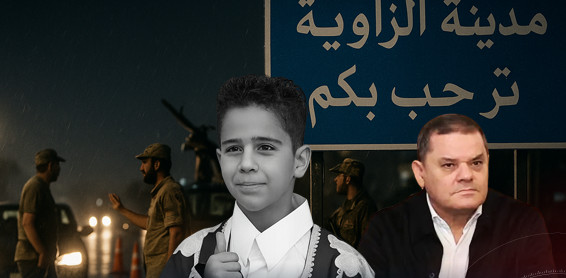In the Al-Shurafa neighborhood, time stopped on a fleeting evening that became a landmark in the memory of a city that has learned to sleep to sounds unlike lullabies. The child Moath Marwan Al-Marghani passed away, and his brother Abdulrahman was injured, adding a new page to a long record of deferred fear, where the road turns into a maze, the window into a wall, and the city into an endless wait.
Pain That Knows Its Way
Violence in Zawiya does not come from a vacuum. It comes in waves: swift clashes, indiscriminate projectiles, hastily closed roads, and the pulse of neighborhoods that falters between a security retreat and the expansion of armed groups funded by a relentless parallel economy. Since the beginning of the year, the story repeats with a single ending: civilians pay the price.
Al-Shurafa Neighborhood… The Name That Became News
That evening, the neighborhood was filled only with small routines: a balcony propping up the sunset, a mother calling her children, and doors preparing for a quiet night. But the projectile preceded the prayers. Moath fell while holding his brother’s hand, afraid for him of the cars, leaving behind questions that no statement can answer: Where did the shrapnel come from? Why does it reach children before justice? And how can a child be returned to his mother with words?
The Cycle of Violence… and Government Failure
The facts show that the security campaigns announced by the government of Abdul Hamid Dbeibeh and his Ministry of Interior, headed by Imad Trabelsi, the sporadic raids announced by the Ministry of Defense, headed by Dbeibeh himself and his deputy Abd al-Salam Zoubi, and the strikes they described as “precise,” have not yielded sustainable security. The results remained without structural impact: no drying up of smuggling sources, no clear hierarchy for weapons, and no plan to protect neighborhoods from a repeat of the story. With each round, the gap widens between promises of protection and the reality on the street, which observers consider a catastrophic failure for Dbeibeh personally and his government.
The State, When It Is Late
Eyes turn once again to Dbeibeh’s government, its chief of staff, and its armed factions, who have repeatedly pledged that “their government would extend its sovereignty” over the city. But the residents hear something else: the whistle of bullets, the doors of emergency rooms, and the names memorized in their absence. In Zawiya, the problem is no longer a lack of statements; the problem is that mothers now read the news before they can enjoy their sleep.
What Do the People Ask For?
The residents are asking for nothing more than postponed basics: a public plan with reviewable timelines, fixed security checkpoints and foot patrols inside neighborhoods, investigations whose results are announced, not shelved, and a strict drying up of illicit funding sources that keep the fire smoldering beneath the ashes. They ask for what is fitting for a city that wants to live without waiting lists for funerals.
A Conclusion That Doesn’t Want to Be a Conclusion
In Zawiya, questions creep into the details of the day: Will all the children return from their schools? Will the evening be completed without interruption? And can a city, exhausted from spinning in the same circle, find a straight path to safety? Another name is added to memory, and an old lesson is renewed: nothing is more precious than the tranquility of a home that closes its door in peace.
